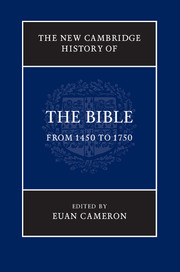Book contents
- Frontmatter
- Contents
- List of figures
- List of contributors
- Preface
- List of abbreviations
- Introduction
- PART I RETRIEVING AND EDITING THE TEXT IN EARLY MODERN EUROPE
- PART II PRODUCING AND DISSEMINATING THE BIBLE IN TRANSLATION
- 7 Publishing in print: Technology and trade
- 8 Latin Bibles in the early modern period
- 9 The Luther Bible
- 10 Bibles in the Dutch and Scandinavian vernaculars to c. 1750
- 11 German Bibles outside the Lutheran movement
- 12 Bibles in French from 1520 to 1750
- 13 English Bibles from c. 1520 to c. 1750
- 14 Bibles in Central and Eastern European vernaculars to c. 1750
- 15 Bibles in Italian and Spanish
- PART III PROCESSING THE BIBLE: COMMENTARY, CATECHESIS, LITURGY
- PART IV THE BIBLE IN THE BROADER CULTURE
- PART V BEYOND EUROPE
- Afterword
- Select bibliography
- Select Bible bibliography
- Index
11 - German Bibles outside the Lutheran movement
from PART II - PRODUCING AND DISSEMINATING THE BIBLE IN TRANSLATION
Published online by Cambridge University Press: 05 August 2016
- Frontmatter
- Contents
- List of figures
- List of contributors
- Preface
- List of abbreviations
- Introduction
- PART I RETRIEVING AND EDITING THE TEXT IN EARLY MODERN EUROPE
- PART II PRODUCING AND DISSEMINATING THE BIBLE IN TRANSLATION
- 7 Publishing in print: Technology and trade
- 8 Latin Bibles in the early modern period
- 9 The Luther Bible
- 10 Bibles in the Dutch and Scandinavian vernaculars to c. 1750
- 11 German Bibles outside the Lutheran movement
- 12 Bibles in French from 1520 to 1750
- 13 English Bibles from c. 1520 to c. 1750
- 14 Bibles in Central and Eastern European vernaculars to c. 1750
- 15 Bibles in Italian and Spanish
- PART III PROCESSING THE BIBLE: COMMENTARY, CATECHESIS, LITURGY
- PART IV THE BIBLE IN THE BROADER CULTURE
- PART V BEYOND EUROPE
- Afterword
- Select bibliography
- Select Bible bibliography
- Index
Summary
Martin Luther's translation of the Bible cast a long shadow over rival attempts in the early modern period to produce German-language versions of Scripture. Widely admired for its accuracy and elegance, Luther's Bible wielded an authority unmatched by any other translation in the years from the Reformation to the revolutionary age of the late eighteenth century. Nevertheless, significant efforts were made, particularly by members of the Reformed churches, who laboured tirelessly to produce scholarly and usable Bibles that would meet theological and pastoral needs. In truth, however, the German Bibles that emerged from Zurich, Heidelberg and Herborn, for all their fidelity to the ancient languages and humanist techniques, reached only relatively small and disparate audiences, and failed to capture the imagination of broader Protestantism. The fragile and fractious world of the German-speaking Reformed churches was not congenial to the emergence of one Bible to match Luther and his heirs. The Reformed churches in the Empire were dwarfed by a Lutheran majority and gravely endangered by the Thirty Years War, in which they lost their stronghold in Heidelberg and numerous libraries. The Swiss, in turn, remained as divided as ever, unable to agree on an authoritative Bible. In the Protestant lands of the eastern part of the Confederation, as well as in the major churches of Basel and Berne, Luther's translation was preferred by many to the so-called Zurich Bible. This tendency was also strong within the Empire, where the Calvinist churches remained inclined to Luther's translation until the end of the sixteenth century: the one major attempt to produce a Reformed German translation proved a failure.
Zurich
During the early 1520s Luther's Bible translations flowed from the presses of Adam Petri and Thomas Wolff in the Swiss city of Basel, the intellectual and commercial heart of the Confederation. In the brief period between September 1522 and 1524, Petri and Wolff accounted for ten editions of Luther's New Testament. The three volumes of the Wittenberg Old Testament were reprinted by Petri in Basel, though the language was adapted for an Upper Rhine audience and Konrad Pellikan added a considerable number of philological and theological glosses, particularly for the Pentateuch.
- Type
- Chapter
- Information
- The New Cambridge History of the Bible , pp. 263 - 284Publisher: Cambridge University PressPrint publication year: 2016



